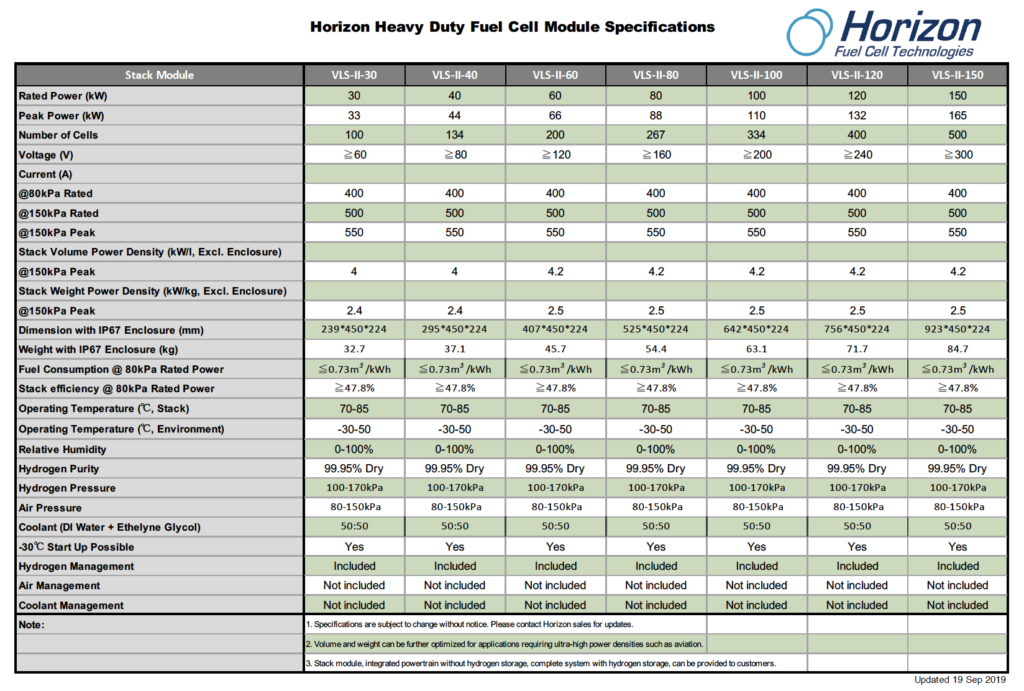
- Horizon has commenced production of the world’s highest power PEM fuel cells for heavy-duty applications, with 300kW stacks to be released in 2020
SHANGHAI, CHINA— Horizon Fuel Cell Group has announced the commencement of volume production of its high-performance VLS-II series fuel cell stacks for commercial vehicles, with an initial focus on heavy-duty trucks. Leveraging mass production techniques and delivering enough power to replace large diesel engines, these new automotive stacks will play an important role in achieving decarbonization goals around the world.
Horizon liquid-cooled fuel cells are already powering around 10 different bus and truck platforms, with power output ranging from 60 to 150kW. Confirmed deliveries of hundreds more systems by year-end validates recent investments made by Horizon in high volume production facilities, including recently commissioned roll-to-roll MEA (Membrane Electrode Assembly) processing.

Horizon’s VLS-II stacks have been optimized for durability and long operating life, in order to address the heaviest utilization scenarios for commercial vehicles, while providing high power density of 4.2kW per liter. Most fuel cell modules used in heavy vehicles to date have been 80kW or less, with peak power density under 3kW per liter. Higher power density and optimized balance of plant delivers the lowest system cost.
The first model released is capable of 150kW, with fuel cell stack weight in IP67 enclosure around 80kg. Horizon aims to use performance advantages to establish the benchmark in fuel cell systems for heavy vehicles, where weight is money.
The VLS-II fuel cell stacks are based on patent-pending ultra-thin bipolar plate technology, which delivers high power density without compromising durability. With this advanced fuel cell technology, Horizon expects fuel cell heavy-duty trucks to achieve more competitive total cost of ownership than diesel trucks in the near future while eliminating cancer-causing NOx and PM2.5 emissions from those vehicles.
As power output continues to increase from fuel cell systems, total decarbonization of heavy vehicles, earthmoving equipment, port equipment, trains, and ships comes into view as a very achievable goal.
Horizon has also confirmed work on PEM fuel cell stacks for emerging electric equipment platforms demanding even higher power density than current designs. Optimized for passenger vehicle and weight-sensitive applications, stack weight drops by around 15% and power density exceeds 4kW per kg (or 5kW per liter).
Mr. George Gu, Chairman of Horizon Group, shed some light on the near-term plans for Horizon: “While 150kW is seen as a high-power fuel cell today, we know that the move to electric equipment and systems is steadily towards larger and heavier vehicles and machinery. To enable the total decarbonization of such equipment with attractive economics and easy integration, we aim to deploy single stacks up to 300kW from 2020. Higher throughput production techniques such as roll-to-roll MEA coating are essential in driving production capacities up, and costs down.”
About Horizon:
Horizon is a fuel cell pioneer and global leader in fuel cell commercialization, having been engaged in fuel cell R&D for 16 years. Horizon supplies a full range of fuel cell systems, from low power air-cooled fuel cells through to high power automotive modules, and containerized MW-scale fuel cell power plants. Horizon has deep IP in all core technologies of PEM fuel cells, from catalyst, membrane electrode, bipolar plates, and stacks, to system control.
Visit www.horizonfuelcell.com
Read the most up to date Fuel Cell and Hydrogen Industry news at FuelCellsWorks




